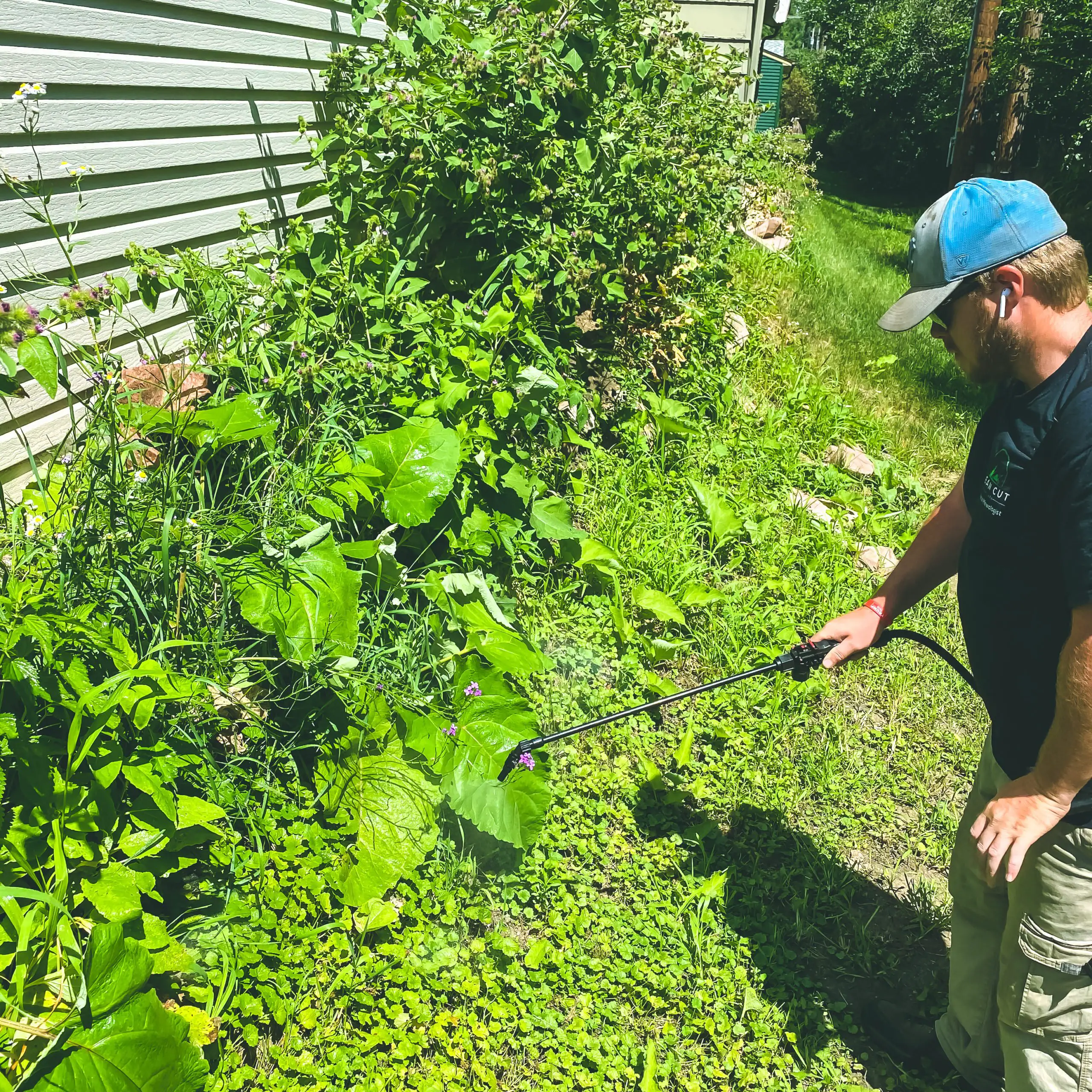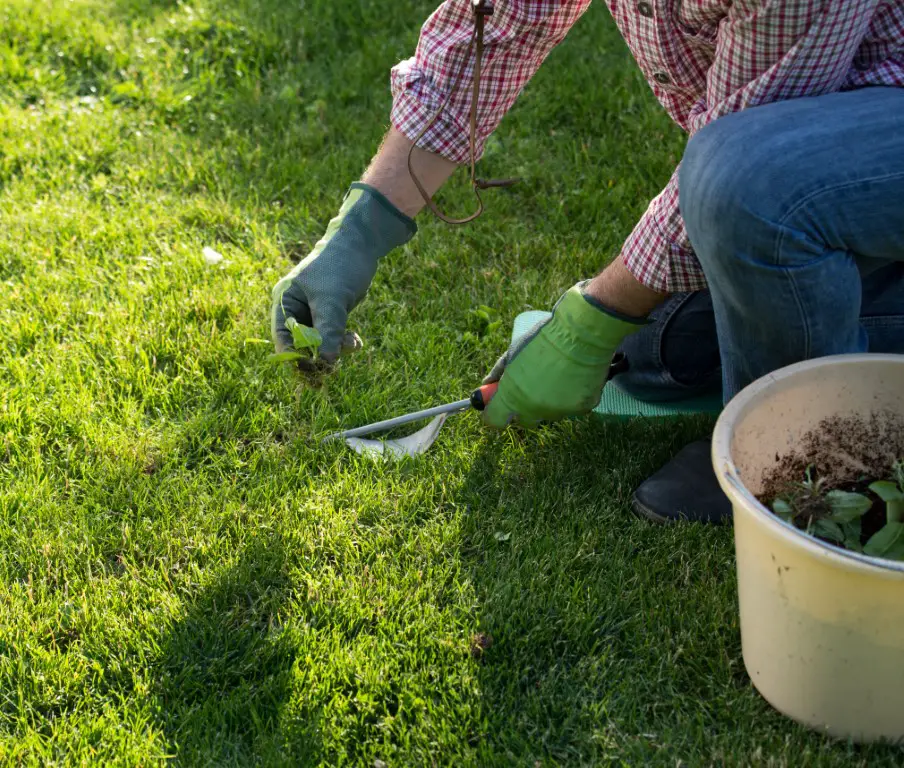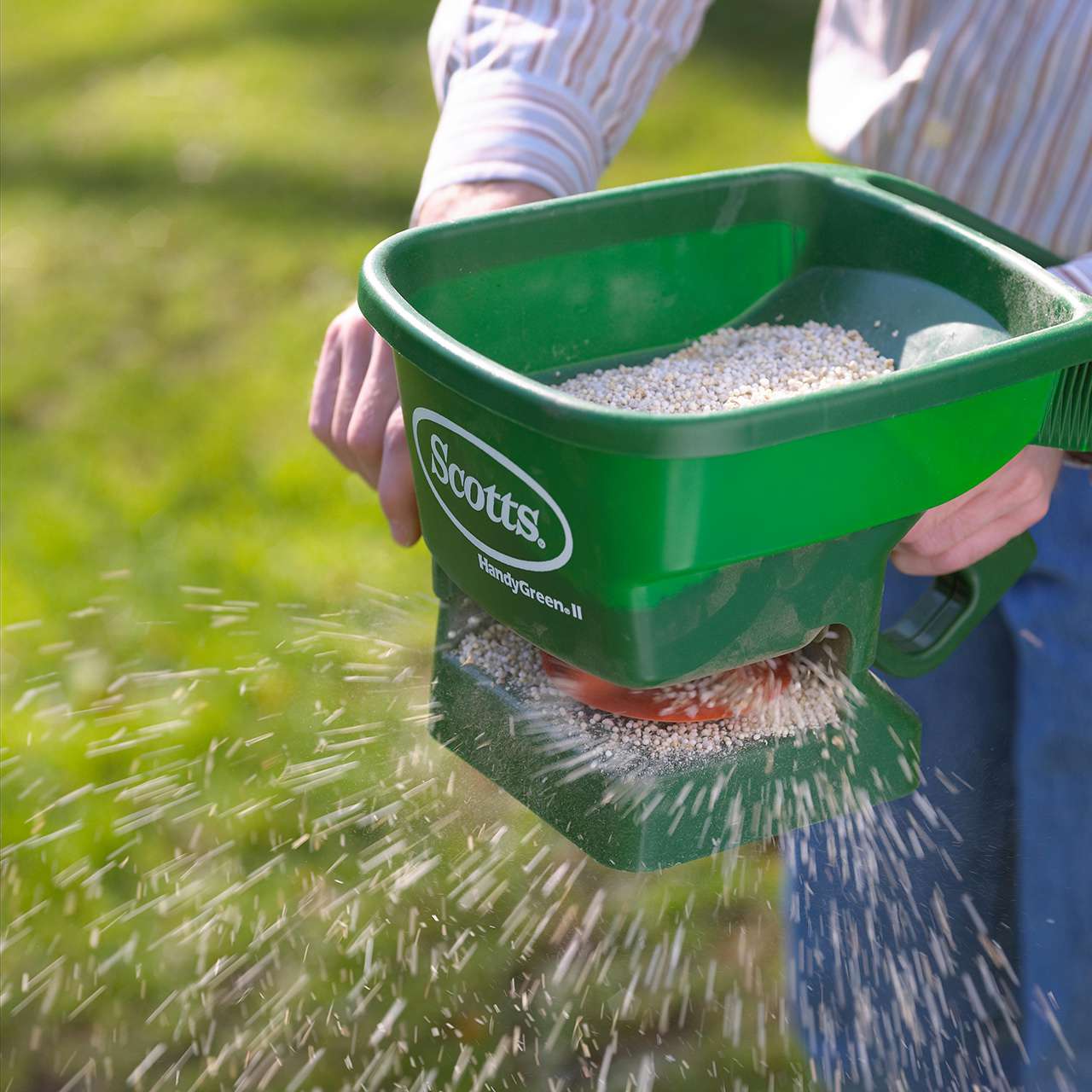The Case For Tolerating Wild Violets
Because wild violets have pretty flowers that bloom early and often, not everyone regards this plant as a weed. Many homeowners choose to let these wildflowers grow in their lawns and elsewhere.
There are several reasons for tolerating wild violets in the lawn:
- It makes for a low-maintenance lawn.
- It avoids the use of herbicide.
Managing Weeds In Lawns
- Identifying weeds and understanding why they’re growing where they are is key to controlling them.
- Try to tolerate a few weeds as long as your lawn is generally healthy.
- Some non-chemical cultural practices favor desirable grasses over weeds.
- If you do use chemicals, different lawn situations may need different types of herbicides.
- When using herbicides, follow the label directions exactly as printed on the product container.
A weed is described as “a plant out of place.” What may be a hated weed invader for some, might be a tolerable ground cover to someone else.
While sustainable lawns may have some weedy plants in them, having well-adapted grass varieties will help keep weeds to a minimum.
- A few weeds in a lawn are not a serious threat to lawn health.
- You can adjust cultural practices to keep plants healthy when controlling weeds with reduced or no use of herbicides.
- Find out the reasons behind increased weed growth before using an herbicide to kill weeds. Killing weeds without correcting underlying problems only invites continued and often increased weed invasion.
- Promote plant health to create a vigorous lawn that can prevent any serious weed problems from taking over.
- Knowing which weeds are invading your lawn is important when deciding whether or not control measures are needed and when they need to be carried out. It is also important in determining the most appropriate herbicide product to use, if needed.
These steps are one example of a simple weed control plan:
Chemical Control By Weed Species
Herbicides or combinations of herbicides used to control weeds are listed, by weed species, in Tables 4 and 5. For convenience, additional information is provided on tolerant species, dates of application, and methods of application. These suggestions are not a substitute for pesticide labels. The label provides detailed information on safety and proper use of the herbicide. Read the entire label before applying any pesticide.
Don’t Miss: How Do You Dethatch Your Lawn
How To Kill Weeds Without Killing Your Lawn
Having a beautiful lawn comes at a price. Either you spend a moderate amount of money and spend a good amount of time doing it yourself, or you hire a company to handle it for about $350 per season.
Its a question of how much time are you willing to invest in it, can you properly do it or do you need help, and is it something you enjoy doing?
Regardless of if you do it yourself or hire some help, your goal is the same: Have a beautiful green lawn with no weeds. A weed free lawn comes down to prevention and a strategy for removal if they begin to grow. This blog will go over strategies on how to complete both so that you can maximize your chances of success.
How To Manage Lawn Weeds At Your Houston Commercial Property

4 Minute Read
Looking out over your commercial propertys turf, you notice something suspicious. What was once lush, green, healthy-looking grass, now looks discolored, thin, and filled with tiny flowers and seed heads. Dreaded lawn weeds have crept in and found their home in your turf.
Undoubtedly, one of the most frustrating aspects of commercial lawn care in Houston is the ongoing battle against lawn weeds. Lets discuss why lawn weeds can be so difficult to manage and several techniques to help kick lawn weeds to the curb for good.
Also Check: How To Choose Fertilizer For Lawn
How To Prevent Weeds In The Yard
Pre-emergent herbicide might seem like the most effective weed prevention method, but it doesnt take home the gold. The secret to preventing weeds from growing in the yard is good lawn care.
Its simple: The healthier your lawn, the less likely it will grow weeds. A dense, healthy lawn will block out a sprouting weed with ease.
So, how can you keep your lawn healthy and well maintained? Here are a few tips to follow:
Prevent Weeds By Keeping Your Lawn Healthy
The best way to prevent weeds is by keeping your lawn healthy. Often times, weeds are a sign that your lawn doesnt have enough nutrients or has poor soil.
To keep your lawn healthy, you should water your lawn regularly, fertilize your lawn several times a year, and treat any lawn diseases as soon as possible.
Read Also: What Is My Lawn Mower Worth
Off With Their Heads With A Scuffle Hoe
The scuffle hoe gets its names from the double-edged hinged blade that rocks back and forth with a push-pull motion. As it rocks, it slices weeds off at the crown. Repeated beheading depletes the weed roots of stored food and the plant dies. Shallow cultivation also avoids bringing more weed seeds to the surface where they can sprout.
Can I Place Weeds And Diseased Plant Debris From The Vegetable Garden In The Compost Pile
It would be best to place weeds that are producing seeds and diseased plant debris in biodegradable bags and have the material picked up and composted by a municipal or commercial composting facility. The temperatures in home compost piles seldom get high enough to kill weed seeds and disease pathogens. However, the weed seeds and disease pathogens will be destroyed by the higher temperatures at municipal and commercial composting facilities. The compost produced at composting facilities can often be purchased by home gardeners and commercial landscape companies.
You May Like: How To Get Rid Of Bugs In The Lawn
Water Your Plants Only
When you water your garden, there are multiple reasons to water using soaker hoses. The most important reasons are soaker hoses can help stop diseases from spreading because there is no splash or runoff which carries dirt to the stems of your plants.
But most importantly for this topic is soaker hoses only water at the base of the plants you want them to. This stops water from being applied to germinated weed seeds.
Without water, weeds cant prosper. If you want to stop the weeds, youll need to stop watering them. Using an irrigation watering system should do the trick.
Control Of Broadleaf Weeds In The Lawn
Dandelion, plantain, and white clover are common perennial broadleaf weeds in lawns. Broadleaf weeds in lawns can be removed manually by pulling and digging or destroyed with broadleaf herbicides.
In small areas, some weeds can be controlled by pulling and digging. This method is best accomplished after a heavy rain or deep watering. Unfortunately, pulling and digging is often ineffective on deep-rooted weeds.
In many situations, herbicides are the only practical method of weed control. Effective broadleaf herbicides include 2,4-D, MCPP, and dicamba. The most effective broadleaf herbicide products contain a mixture of 2 or all 3 of these compounds. Combination products control a wider range of broadleaf weeds than a single compound. For example, 2,4-D does an excellent job on controlling dandelions, but is relatively ineffective against white clover. MCPP, on the other hand, provides excellent control of white clover and only fair control of dandelions. Products containing 2,4-D and MCPP effectively control dandelions and white clover. Triclopyr is another broadleaf herbicide. It is typically used on hard-to-kill broadleaf weeds.
This article originally appeared in the August 24, 2001 issue, pp. 106-107.
You May Like: How To Price Lawn Care Jobs
Why Diy Weed Control Can Be Costly And Time
Many homeowners will purchase do-it-yourself home treatment options from local retailers, such as fertilizers or herbicides, for controlling weeds. Unfortunately, sometimes these individuals will apply too little or too much product, generating poor outcomes.
These liquids, granular formulas, and other options are primarily one-size-fits-all solutions that generate mediocre results. When you choose a professional lawn care company, they will assess the type of weeds on the premises, the type of soil, the moisture levels, etc. Having assistance from an experienced lawn treatment professional ensures that an appropriate product is selected and applied based on the many variable factors.
Chemical Control Of Broadleaf Weeds

Broadleaf weeds are usually controlled with selective postemergence herbicides. The most common broadleaf herbicides used in turf include 2,4-D, 2,4-DP , MCPP , dicamba, clopyralid, and triclopyr. There are many different commercial formulations and mixtures of these compounds .
| Generic name | Trade name |
|---|---|
| *Products containing clopyralid should not be used on residential lawns, but they can be used on institutional grounds, athletic fields, and golf courses. | |
| 2,4-D | |
| Isoxaben | Gallery 75 DF |
It is extremely important to identify the weed to be controlled before selecting one of these herbicides. All have the potential to damage trees, shrubs, flowers, and vegetables if they contact the foliage. Trees and shrubs are particularly sensitive to dicamba since this herbicide is mobile in the soil and can be taken up by tree roots.
Liquid postemergence broadleaf herbicides are available as salts and esters. The most popular salt formulation is the amine salt. The amine salt is soluble in water and suitable for spray applications. Amine formulations are nonvolatile, but they can react with calcium and magnesium ions to form insoluble salts.
Also Check: How To Make My Lawn Dark Green
Pry Weeds From Paving With A Weeder
The Telescoping Crack Weeder from Lee Valley Tools removes grass and other weeds from crevices in patios and walkways. The L-shaped stainless-steel blade fits between bricks and other pavers to reach and scrape pesky plants. The aluminum handle adjusts from 28 to 45 in., which means you can weed kneeling or standing.
Faq About Weed Control
1. How do I control garden weeds?
Your yards turfgrass isnt the only area where weeds will set up camp. Your yards trees, shrubs, flower beds, and vegetable garden are also susceptible to weed growth. Herbicides and manual removal offer effective weed control in planting beds, as does: Covering weeds with organic or inorganic mulch. The mulch will block the weeds from sunlight and prevent new weeds from sprouting. Covering the weeds with newspaper or cardboard. This method will also block the weeds from the sun. Installing landscape fabric beneath the soil. Landscape fabric prevents weeds from sprouting. Caution: When applying herbicide to your vegetable garden, always read and follow the products instructions to avoid contaminating your vegetables.
2. How do I control weeds between pavers?
Weeds sprouting between your walkway pavers is a bruise on your yards curb appeal. The good news is that there are a few ways you can reduce weed growth around your walkways and patios: Spot treat with a selective or non-selective herbicide Fill the space between the pavers with polymeric sand to block germinating weeds from the sunlight. Dig up the weeds using a manual tool designed for narrow spaces, such as a Cape Cod weeder.
3. How do I control weeds in a newly seeded lawn?4. Are weed-and-feed products good for my established lawn?5. Why are weeds bad for my lawn?
Don’t Miss: How Do You Know If Your Lawn Has Grubs
What Types Of Weeds Are In My Turf
Florida is home to many varieties of lawn weeds. Depending on what type of grass makes up your turfgrass, like Zoysiagrass or St. Augustine grass, you may have to battle various weeds.
Here are some of the most common types found across Central Florida yards.
| Type Of Weed | |
|
|
|
|
|
|
To develop the best weed prevention and elimination plan, you should contact professional landscapers to ensure you remove the annoying plants from your lawn and garden altogether. Otherwise, your efforts will be in vain.
Add Your Heading Text Here
Many of us want our lawns to be weed free and contain only the cultivated grass types that we would associate with a well-managed lawn which looks pleasing to the eye.
In terms of keeping weeds under control, there are a variety of things that can be done by the home owner before the application of any chemicals is considered. Any lawn management programme which brings about complete grass coverage will help greatly with keeping the weeds at bay. This ought to include regular cutting and lawn feeding several times per year, as well as routine cultural activities such as scarification and aeration.
Where practical, regular irrigation of the grass during spells of dry weather throughout the growing season will also help with maintaining healthy grass coverage. This becomes particularly apparent during prolonged dry spells, when lawns become drought stressed and the thinning turf provides a gateway for a fresh crop of weeds.
If you have a lawn full of weeds like these, then in all reality the only effective means of control at your disposal will be to use a selective herbicide. Selective, because its intended to provide effective control of the weeds ONLY and is NOT to be confused with a systemic herbicide such as those containing glyphosate. These are designed to control everything.
Don’t Miss: What Is The Best Lawn Care Products
Managing Weeds In Warm Season Lawns
Factsheet | HGIC 2310 | Jul 13, 2022 | |
Annual trampweed is a winter annual weed that becomes established in lawns that are mowed very low and not irrigated or fertilized adequately. The fluffy seeds will blow in the wind. For more information, see HGIC 2319, Annual Trampweed.Joey Williamson, ©2015 HGIC, Clemson Extension
Bermudagrass, centipedegrass, zoysiagrass, and St. Augustinegrass are the most popular warm-season turfgrasses grown in South Carolina. Warm-season refers to the fact that they prefer the warm temperatures of spring and summer to grow. In the winter months, they do not actively grow, but become dormant and the foliage turns tan.
The Weed Control Timing Chart
Herbicides may be almost completely ineffective if applied at the wrong time of year. There is an optimum time frame to apply an herbicide to each weed. In most cases, this time is early in the weeds life cycle, but in some cases, herbicides should be applied during a different growth stage. Generally, weeds should be actively growing when an herbicide is applied. In certain instances, only a pre-emergent herbicide may provide effective control. Remembering when to apply herbicides for the many different weeds can be a challenge. The herbicide label provides definitive information concerning the turf growth stage, time of day, and weather conditions when the product may be applied, but this simple chart can help in making a plan for the timing of lawn weed control.
The Lawn Weed Control Timing Chart was developed to help remove confusion and guesswork when determining the recommended time of year to control various weeds in lawns. The chart is arranged with a list of common weeds in rows on the left, and months of the year in columns on the top of the chart. The row for each weed listed has a colored bar in the row, indicating the time frame when the weed may be most effectively controlled. Green bars indicate application time ranges for post-emergent herbicides , and goldenrod bars indicate application time ranges for pre-emergent herbicides.
Don’t Miss: How To Get Rid Of Violets In My Lawn
Using A Lawn Weed Killer
If you have a lot of weeds to get rid of, then using the best weed killer for lawns is the most effective method of control.
Lawn herbicides are selective. This means they target weeds without killing common types of turfgrass.
Theyre formulated to be effective at killing:
- Broadleaf weeds such as dandelion, clover, and chickweed
- Grassy weeds such as foxtail, quackgrass, and crabgrass
- Grass-like weeds such as nutsedge, wild onion, and wild garlic
But you still have to be careful when using them. Not all products are safe to use on all grass types. So check first to make sure your grass is recommended.
Also, stay away from non-selective weed killers containing ingredients such as glyphosate. These kill all vegetation, including your grass.
Herbicides are easy to use. Just mix the concentrate with water and add it to a good weed killer sprayer. Then make sure you soak the target weeds as you spray your lawn.
The weeds should turn brown and die. But, depending on the herbicide, the time taken can vary.
Systemic weed killers are best for killing the plants to the root and preventing them from growing back. But you have to be patient when using them, as they can take from 2-4 weeks for a complete kill.
After the weeds have died you can use a rake and tilling fork to clear the leftover plant from the soil in preparation for reseeding the area or laying sod if necessary.
You May Like: How To Kill Ferns In My Lawn
How Do I Control Dandelions And Other Broadleaf Weeds In My Lawn

In small areas, some weeds can be controlled by pulling and digging. This method is best accomplished after a soaking rain or deep watering. Unfortunately, pulling and digging is often ineffective on deep-rooted weeds.
In many situations, herbicides are the only practical method of weed control. Effective broadleaf herbicides include 2,4-D, MCPP, MCPA, dicamba, triclopyr and others. The most effective broadleaf herbicide products contain a mixture of two or three herbicides as no single compound will control all broadleaf weeds. Fall is the best time to apply broadleaf herbicides in Iowa. Broadleaf herbicides can be applied as liquids or granules and often in combination with fertilizer. Note that a preemergence herbicide for crabgrass will not control broadleaf weeds.
Don’t Miss: How To Put Lawn Seed Down